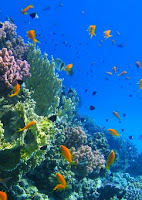Coral reefs in the Red Sea's Gulf of Aqaba can resist rising water temperatures. If they survive local pollution, these corals may one day be used to re-seed parts of the world where reefs are dying. The scientists urge governments to protect the Gulf of Aqaba Reefs.
Coral reefs are dying on a massive scale around the world, and global warming is driving this extinction. The planet's largest reef, Australia's Great Barrier Reef, is currently experiencing enormous coral bleaching for the second year in a row, while last year left only a third of its 2300-km ecosystem unbleached. The demise of coral reefs heralds the loss of some of the planet's most diverse ecosystems.
Now, scientists at EPFL (Ecole polytechnique fédérale de Lausanne) and UNIL (Université de Lausanne) in Switzerland, and the Mina and Everard Goodman Faculty of Life Sciences at Bar-Ilan University and the InterUniversity Institute of Marine Sciences in Israel, have shown that corals in the Gulf of Aqaba in the Northern Red Sea are particularly resistant to the effects of global warming and ocean acidification. The results were recently published in the journal Royal Society Open Science.
The implications are important, as the Gulf of Aqaba is a unique coral refuge. The corals may provide the key to understanding the biological mechanism that leads to thermal resistance, or the weakness that underlies massive bleaching. There is also the hope that the Gulf of Aqaba Reefs could be used to re-seed deteriorated reefs in the Red Sea and perhaps even around the world.
Coral Reefs in the Gulf of Aqaba May Survive Global Warming, New Study Finds

No comments:
Post a Comment